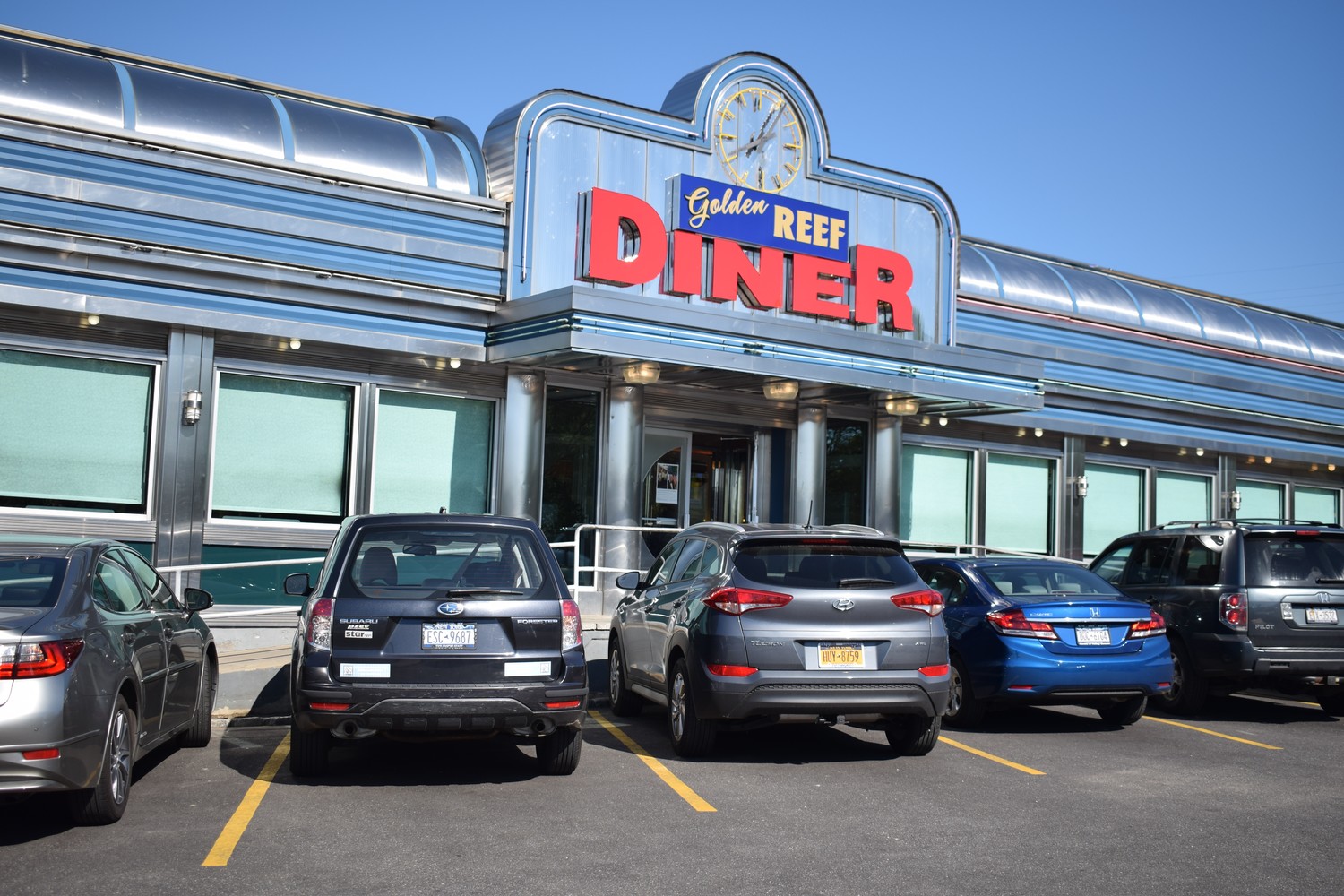Rockville Centre community upset after Golden Reef Diner waiter deported
It was supposed to be like any other Sunday morning. Warren Prosky would walk into the Golden Reef Diner in Rockville Centre, and before he could even ask, Sokol Vokshi — known as Sal to everyone at the food establishment — would sit Prosky down and have his regular breakfast ready on order. It had been that way for years. But on April 8, Prosky couldn’t find his usual waiter.
“Jimmy, the owner, walked up to me and said I wouldn’t be able to see Sal that day,” Prosky said. “Or any other.”
Taken aback by Jimmy Trahanas’s words, Prosky learned what had happened to the man who had served him and many others at the Sunrise Highway diner. As has happened with so many immigrants in the past year, Vokshi — an Elmont homeowner who had lived in the United States for 25 years — was arrested and deported during his regular check-in with immigration officials. In the span of four days, Vokshi, 47, was separated from his customers, his wife and his two daughters, a 14-year-old and a 12-year-old who has autism.
A sudden nightmare realized
After living for more than two decades in the United States, Vokshi believed he was safe from deportation. He arrived in 1993 as an Albanian immigrant, seeking political asylum. His request was ultimately denied, and he was tagged with a removal order. Despite that, he stayed, having work authorization papers, and lived a normal life, settling down with a wife, who is also Albanian, buying a home in Elmont and raising two children. Vokshi would meet with U.S. Citizenship and Immigration Services agents every year to review his case, and he would be denied residency every time.
“I tried so many ways to get my papers, but everyone said there was not much that they could do because of the removal order on me,” Vokshi told the Herald during a WhatsApp video call.
He became accustomed to this pattern of meetings and rejections, but all of that changed in January 2017. After his election, President Donald Trump issued an executive order to change deportation priorities for the Department of Homeland Security and all immigration enforcement agencies. In a statement, DHS officials said they were ordered to prioritize the arrests and deportations of undocumented criminal immigrants, those who pose a threat to national security and those who have final orders of removal in place. DHS officials added that they would no longer issue exemptions to any immigrant group.
“When Obama was president, I would go every year for my hearing, but with Trump, the time in between my hearings was getting shorter and shorter,” Vokshi said. “Now I was going every three months.”
He became increasingly worried about his family’s situation, because agents were also questioning his wife. On April 2, Vokshi and his lawyer, Altin Nanaj, paid their regular visit to the USCIS office at Federal Plaza in New York City. Nanaj had the usual papers ready to hand over when ICE agents suddenly appeared and told them that they were there to deport Vokshi. As Nanaj pleaded on his client’s behalf, Vokshi was taken from the room. Agents arrested him and put him in a holding room.
“It’s appalling to me that this could happen to someone like him,” said Shelly Schweiger, 75, a frequent customer who has know Vokshi for about 12 years. She called him warm and friendly, noting his work ethic and that he is a good father. “When people come into this diner, they all ask for Sal.”
When it came to remembering customers’ orders, she added, Vokshi always was extraordinary. Schweiger said Vokshi would ask about your family, and act “like a friend.”
After being arrested, he was transferred to ICE’s Hudson County Correctional Facility in New Jersey, a detention center that is now closing after years of reports about the mistreatment of immigrants and poor cell conditions. On April 5, Sal was transferred back to New York and given a ticket for a one-way flight to Albania. As he had done for the past four days, Vokshi pleaded with the agents.
“Please, I work, I pay my taxes, I have a house, I have kids who were born here,” he said. “And their response was always, ‘So what?’”
The next time Vokshi would see his family was via a video call through the Whats-App international messaging application. He was now in Deres, Albania, staying with his sister.
“I still don’t believe it,” said Sia Vouniseas, who has worked with Vokshi for 14 years. “I still feel like he is going to walk through that door every day.”
She said she has spoken to Vokshi since his deportation and that he misses everyone at the diner. “I miss him very much,” Vouniseas added, fighting back tears.
Bring Sal back
As Warren Prosky heard this story, which he described as “living through the American nightmare,” he knew he had to do something for Vokshi. With the help of his daughter, Prosky launched a GoFundMe campaign to raise money to help Vokshi and his family. The online crowd-funding page, aptly named “Get Sal back to the U.S.A.,” has raised more than $9,500 to date from local residents who want their favorite waiter back.
“The customers were always very fond of him,” said Trahanas, who posted about the GoFundMe page at the Golden Reef. “Sal was the most lovable person in the diner.”
The donors’ posts on the page had a common theme. They all wished for their friend to return, for their government to realize that Vokshi was an asset to the community and that families should not be broken up in the way Vokshi’s was. Prosky explained that Vokshi was popular because, when he served you, it was like you were dining with a friend.
“He’s not the guy you want to throw out of your country,” Prosky said.
Whenever Vokshi speaks of the GoFundMe page, he cannot help but share his excitement over how many of his customers are rooting for him. More than 100 people have donated so far, and Vokshi said that he could never repay the donors for what they have done. But the joy he feels is short-lived as reality adds obstacles to Vokshi’s return.
Because he was recently deported, Vokshi will not be granted any form of visa quickly. His only hope for a speedy return is if his lawyer successfully argues that he needs to be allowed back to care for his daughters. He will have to wait two to three months to receive an answer on his case.
Trahanas, an immigrant himself, said Vokshi was a fine man and a family man who bought and paid off his house in Elmont. “Yet for whatever reason, he was deported.” Trahanas said he would “immediately” hire Vokshi again if he returned.
As he waits in Albania, Vokshi makes sure to stay in touch with his daughters. He used to drive them to school every morning, but now he lives more than 4,500 miles away.
“The first thing they say is always, ‘When are you going to come back? Why did they deport you?’” he said.
Vokshi said immigration agents originally planned to deport his wife, but finally agreed to let her stay to take care of her children. He warned his wife to never meet with immigration agents alone, and asked her to take their daughters with her because he dreads the idea of his wife being deported and leaving them alone. But Vokshi also hates the idea of having his daughters, who are American citizens, deported to Albania, disrupting the lives and friendships that they have built in Elmont and Franklin Square. His wife’s next meeting with USICS is in August.
“I’m just praying to be united with my family,” he said. “That’s my goal.”

 44.0°,
Mostly Cloudy
44.0°,
Mostly Cloudy 










